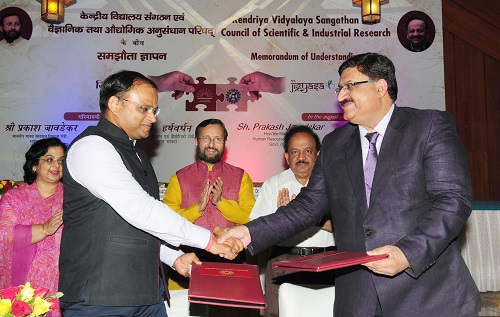CSIR throws open its laboratories across the country to students and teachers of Kendriya Vidyalaya Sanghatan . Named, Jigyasa, the main focus of the plan is to connect students’ classroom learning with that of research laboratory based learning.
Months after being conceived, an ambitious plan to throw open the laboratories of Council for Scientific and Industrial Research, CSIR to school children, the officials of CSIR and Central School Organisation on Thursday (July 06) inked a formal Memorandum of Understanding to formalise it. Thirty eight laboratories under CSIR will handhold students from almost 1150 Central Schools or Kendriya Vidyalayas on week-ends or school vacations to take ‘scriptural concepts’ to ‘laboratory applications’.
The MoU was signed by Dr. Girish Sahni, Director General of CSIR and Santosh Kumar Mall, Chairperson of KVS in the presence of Minister for Science and Technology Dr. Harsh Vardhan and Minister for Human Resource Development Prakash Javedkar. Initially one lakh students and 1,000 students from 400 schools across India will be involved in the plan. It’s focus is to connect school students and scientists so as to extend student’s classroom learning with that of research laboratory based learning. It would inculcate the culture of inquisitiveness amongst school students and teachers.
Named “JIGYASA” the initiative was announced during the Platinum Jubilee Celebrations of CSIR in September 2016. Though the formal agreement was delayed, several CSIR laboratories have already started the students-scientists interaction for several months now.
Speaking on the occasion, Dr. Harsh Vardhan lamented, though India’s scientific growth rate was 13 per cent compared to global 4%, the country could not produce a Nobel laureate in Science & Technology after Sir C.V. Raman in 1930.
HRD Minister Javedkar used the opportunity to tick off the previous UPA regime, saying earlier MoUs were signed, not implemented, but under Prime Minister Narendra Modi, implementation takes precedence over institutional frameworks. He said, in the present time, students have turned competitors for percentage and not seekers of knowledge.


